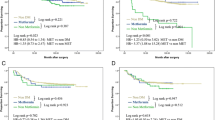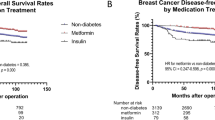Abstract
Purpose
Numerous studies have suggested that metformin treatment can increase breast cancer survival; however, it is unclear whether its effects interact with intrinsic subtype or diabetic status. Therefore, we conducted a large nationwide study to assess this in women with surgically resected invasive breast cancer.
Methods
Patients with newly diagnosed breast cancer between 2007 and 2016 were identified using the national health insurance claims database of South Korea. Metformin or other drug exposures was defined as medication for ≥ 90 days. Breast cancer subtypes were classified into four groups based on hormonal therapy and anti-HER2 treatments.
Results
A total of 117,333 patients were included (median follow-up duration, 90 months). Type 2 diabetes mellitus (T2DM) affected significantly overall survival (OS, 7 years, 89.7% vs. 92.4%, p < 0.001). A significant interaction was found between the use of metformin and insulin in patients with T2DM (p = 0.018). Thus, the subsequent analysis was limited to these patients and propensity score matching was performed. We found significantly increased OS in patients treated with metformin (7-year OS, 88.3% vs. 85.6%, p < 0.001). Interestingly, a significant effect was observed in the hormonal therapy (HT)+/HER2-targeted therapy (Tx)− group (p < 0.001), whereas no specific association was observed in the HT−/HER2 Tx− group (p = 0.220).
Conclusions
Metformin administration may be associated with reduced mortality in patients with surgically resected breast cancer, particularly in the HT+/HER2 Tx− group. Clinical trials investigating metformin as a combination agent in breast cancer should stratify patients by curative resection, intrinsic subtype, the presence of T2DM, and the use of insulin.



Similar content being viewed by others
Availability of data and material
The data that support the findings of this study are available from National Health insurance service sharing service (NHISS, South Korea) but restrictions apply to the availability of these data, which were used under license for the current study, and so are not publicly available.
Code availability
NA.
References
Boyle P, Boniol M, Koechlin A et al (2012) Diabetes and breast cancer risk: a meta-analysis. Br J Cancer 107:1608–1617. https://doi.org/10.1038/bjc.2012.414
Lin C, Cai X, Yang W et al (2020) Glycemic control and the incidence of neoplasm in patients with type 2 diabetes: a meta-analysis of randomized controlled trials. Endocrine 70:232–242. https://doi.org/10.1007/s12020-020-02376-4
Tsilidis KK, Kasimis JC, Lopez DS et al (2015) Type 2 diabetes and cancer: umbrella review of meta-analyses of observational studies. BMJ 350:g7607. https://doi.org/10.1136/bmj.g7607
Hwang K-T, Han K-D, Oh S et al (2020) Influence of metabolic syndrome on risk of breast cancer: a study analyzing nationwide data from Korean National Health Insurance Service. Cancer Epidemiol Biomark Prev Publ Am Assoc Cancer Res Cospons Am Soc Prev Oncol 29:2038–2047. https://doi.org/10.1158/1055-9965.EPI-20-0300
Buono G, Crispo A, Giuliano M et al (2020) Metabolic syndrome and early stage breast cancer outcome: results from a prospective observational study. Breast Cancer Res Treat 182:401–409. https://doi.org/10.1007/s10549-020-05701-7
Bjørge T, Lukanova A, Jonsson H et al (2010) Metabolic syndrome and breast cancer in the me-can (metabolic syndrome and cancer) project. Cancer Epidemiol Biomark Prev Publ Am Assoc Cancer Res Cospons Am Soc Prev Oncol 19:1737–1745. https://doi.org/10.1158/1055-9965.EPI-10-0230
O’Neal J, Clem A, Reynolds L et al (2016) Inhibition of 6-phosphofructo-2-kinase (PFKFB3) suppresses glucose metabolism and the growth of HER2+ breast cancer. Breast Cancer Res Treat 160:29–40. https://doi.org/10.1007/s10549-016-3968-8
Pu H, Zhang Q, Zhao C et al (2015) Overexpression of G6PD is associated with high risks of recurrent metastasis and poor progression-free survival in primary breast carcinoma. World J Surg Oncol 13:323. https://doi.org/10.1186/s12957-015-0733-0
Dowling RJO, Goodwin PJ, Stambolic V (2011) Understanding the benefit of metformin use in cancer treatment. BMC Med 9:33. https://doi.org/10.1186/1741-7015-9-33
Fidan E, Onder Ersoz H, Yilmaz M et al (2011) The effects of rosiglitazone and metformin on inflammation and endothelial dysfunction in patients with type 2 diabetes mellitus. Acta Diabetol 48:297–302. https://doi.org/10.1007/s00592-011-0276-y
Blandino G, Valerio M, Cioce M et al (2012) Metformin elicits anticancer effects through the sequential modulation of DICER and c-MYC. Nat Commun 3:865. https://doi.org/10.1038/ncomms1859
Pimentel I, Lohmann AE, Ennis M et al (2019) A phase II randomized clinical trial of the effect of metformin versus placebo on progression-free survival in women with metastatic breast cancer receiving standard chemotherapy. Breast Edinb Scotl 48:17–23. https://doi.org/10.1016/j.breast.2019.08.003
Tang GH, Satkunam M, Pond GR et al (2018) Association of metformin with breast cancer incidence and mortality in patients with type II diabetes: a GRADE-assessed systematic review and meta-analysis. Cancer Epidemiol Biomark Prev Publ Am Assoc Cancer Res Cospons Am Soc Prev Oncol 27:627–635. https://doi.org/10.1158/1055-9965.EPI-17-0936
Hosio M, Urpilainen E, Hautakoski A et al (2020) Survival after breast cancer in women with type 2 diabetes using antidiabetic medication and statins: a retrospective cohort study. Acta Oncol Stockh Swed 59:1110–1117. https://doi.org/10.1080/0284186X.2020.1769858
Lee KN, Torres MA, Troeschel AN et al (2020) Type 2 diabetes, breast cancer specific and overall mortality: associations by metformin use and modification by race, body mass, and estrogen receptor status. PLoS ONE 15:e0232581. https://doi.org/10.1371/journal.pone.0232581
Nanni O, Amadori D, De Censi A et al (2019) Metformin plus chemotherapy versus chemotherapy alone in the first-line treatment of HER2-negative metastatic breast cancer. The MYME randomized, phase 2 clinical trial. Breast Cancer Res Treat 174:433–442. https://doi.org/10.1007/s10549-018-05070-2
Ki Y-J, Kim HJ, Kim M-S et al (2016) Association between metformin use and survival in nonmetastatic rectal cancer treated with a curative resection: a nationwide population study. Cancer Res Treat 49:29–36. https://doi.org/10.4143/crt.2016.128
Seo Y-S, Kim Y-J, Kim M-S et al (2016) Association of metformin use with cancer-specific mortality in hepatocellular carcinoma after curative resection: a nationwide population-based study. Medicine (Baltimore) 95:e3527. https://doi.org/10.1097/MD.0000000000003527
Jang WI, Kim M-S, Kang SH et al (2017) Association between metformin use and mortality in patients with type 2 diabetes mellitus and localized resectable pancreatic cancer: a nationwide population-based study in korea. Oncotarget 8:9587–9596. https://doi.org/10.18632/oncotarget.14525
Cappelletti V, Iorio E, Miodini P et al (2017) Metabolic footprints and molecular subtypes in breast cancer. Dis Markers 2017:7687851. https://doi.org/10.1155/2017/7687851
Cheol Seong S, Kim Y-Y, Khang Y-H et al (2016) Data resource profile: the national health information database of the National Health Insurance Service in South Korea. Int J Epidemiol. https://doi.org/10.1093/ije/dyw253
Kim S, Kim M-S, You S-H et al (2020) Conducting and reporting a clinical research using Korean healthcare claims database. Korean J Fam Med 41:146–152. https://doi.org/10.4082/kjfm.20.0062
Lipscombe LL, Hwee J, Webster L et al (2018) Identifying diabetes cases from administrative data: a population-based validation study. BMC Health Serv Res 18:316. https://doi.org/10.1186/s12913-018-3148-0
Koo BK, Lee C-H, Yang BR et al (2014) The incidence and prevalence of diabetes mellitus and related atherosclerotic complications in Korea: a National Health Insurance Database Study. PLoS ONE 9:e110650. https://doi.org/10.1371/journal.pone.0110650
Chung IY, Lee J, Park S et al (2018) Nationwide analysis of treatment patterns for Korean breast cancer survivors using National Health Insurance Service Data. J Korean Med Sci. https://doi.org/10.3346/jkms.2018.33.e276
Korean Breast Cancer Society Korea Breast Cancer Society Practice Recommendations of Breast Cancer, 3rd edition
National Comprehensive Cancer Network (성) Breast cancer (Version 2.2020)
Ministry of Land, Infrastructure and Transport Urban general status. In: E-Natl. Indic. http://www.index.go.kr/potal/main/EachDtlPageDetail.do?idx_cd=1200. Accessed 18 Nov 2020
Quan H, Sundararajan V, Halfon P et al (2005) Coding algorithms for defining comorbidities in ICD-9-CM and ICD-10 administrative data. Med Care 43:1130–1139. https://doi.org/10.1097/01.mlr.0000182534.19832.83
Peeters PJHL, Bazelier MT, Vestergaard P et al (2013) Use of metformin and survival of diabetic women with breast cancer. Curr Drug Saf 8:357–363. https://doi.org/10.2174/15680266113136660069
Lawrence WR, Hosler AS, Gates Kuliszewski M et al (2020) Impact of preexisting type 2 diabetes mellitus and antidiabetic drugs on all-cause and cause-specific mortality among Medicaid-insured women diagnosed with breast cancer. Cancer Epidemiol 66:101710. https://doi.org/10.1016/j.canep.2020.101710
Baglia ML, Cui Y, Zheng T et al (2019) Diabetes medication use in association with survival among patients of breast, colorectal, lung, or gastric cancer. Cancer Res Treat 51:538–546. https://doi.org/10.4143/crt.2017.591
Park JH, Kim H-J, Kim CW et al (2021) Tumor hypoxia represses γδ T cell-mediated antitumor immunity against brain tumors. Nat Immunol 22:336–346. https://doi.org/10.1038/s41590-020-00860-7
Choi M, Han J, Yang BR et al (2020) Association of insulin, metformin, and statin with mortality in breast cancer patients. Cancer Res Treat. https://doi.org/10.4143/crt.2020.430
Dowling RJO, Zakikhani M, Fantus IG et al (2007) Metformin inhibits mammalian target of rapamycin-dependent translation initiation in breast cancer cells. Cancer Res 67:10804–10812. https://doi.org/10.1158/0008-5472.CAN-07-2310
Amaral MEA, Nery LR, Leite CE et al (2018) Pre-clinical effects of metformin and aspirin on the cell lines of different breast cancer subtypes. Investig New Drugs 36:782–796. https://doi.org/10.1007/s10637-018-0568-y
Dogan Turacli I, Umudum H et al (2018) Do MCF7 cells cope with metformin treatment under energetic stress in low glucose conditions? Mol Biol Rep 45:195–201. https://doi.org/10.1007/s11033-018-4152-5
Kim J, Lee J, Jang SY et al (2016) Anticancer effect of metformin on estrogen receptor-positive and tamoxifen-resistant breast cancer cell lines. Oncol Rep 35:2553–2560. https://doi.org/10.3892/or.2016.4675
Sonnenblick A, Agbor-Tarh D, Bradbury I et al (2017) Impact of diabetes, insulin, and metformin use on the outcome of patients with human epidermal growth factor receptor 2-positive primary breast cancer: analysis from the ALTTO phase III randomized trial. J Clin Oncol 35:1421–1429. https://doi.org/10.1200/JCO.2016.69.7722
Hampsch RA, Wells JD, Traphagen NA et al (2020) AMPK activation by metformin promotes survival of dormant ER+ breast cancer cells. Clin Cancer Res Off J Am Assoc Cancer Res 26:3707–3719. https://doi.org/10.1158/1078-0432.CCR-20-0269
Lopez-Bonet E, Buxó M, Cuyàs E et al (2019) Neoadjuvant metformin added to systemic therapy decreases the proliferative capacity of residual breast cancer. J Clin Med. https://doi.org/10.3390/jcm8122180
Kang SY, Kim YS, Kim Z et al (2020) Breast cancer statistics in Korea in 2017: data from a Breast Cancer Registry. J Breast Cancer 23:115–128. https://doi.org/10.4048/jbc.2020.23.e24
Funding
This research was supported by the Chungnam National University Hospital Research Fund, 2019 (#2019-CF-027).
Author information
Authors and Affiliations
Contributions
BHK: data curation, formal analysis, methodology, writing—original draft. M-JC: supervision, conceptualization, writing—review and editing. JK: data curation formal analysis, writing—original draft, project administration.
Corresponding author
Ethics declarations
Conflicts of interest
The authors declare no potential conflicts of interest.
Ethical approval
This work was approved by our institutional review board (CNUH 2020-01-028).
Consent to participate
Informed consent was waived due to the retrospective nature of the study based on anonymized database.
Consent for publication
N/A.
Additional information
Publisher's Note
Springer Nature remains neutral with regard to jurisdictional claims in published maps and institutional affiliations.
Supplementary Information
Below is the link to the electronic supplementary material.
About this article
Cite this article
Kim, B.H., Cho, MJ. & Kwon, J. Potential intrinsic subtype dependence on the association between metformin use and survival in surgically resected breast cancer: a Korean national population-based study. Int J Clin Oncol 26, 2004–2016 (2021). https://doi.org/10.1007/s10147-021-02005-8
Received:
Accepted:
Published:
Issue Date:
DOI: https://doi.org/10.1007/s10147-021-02005-8




